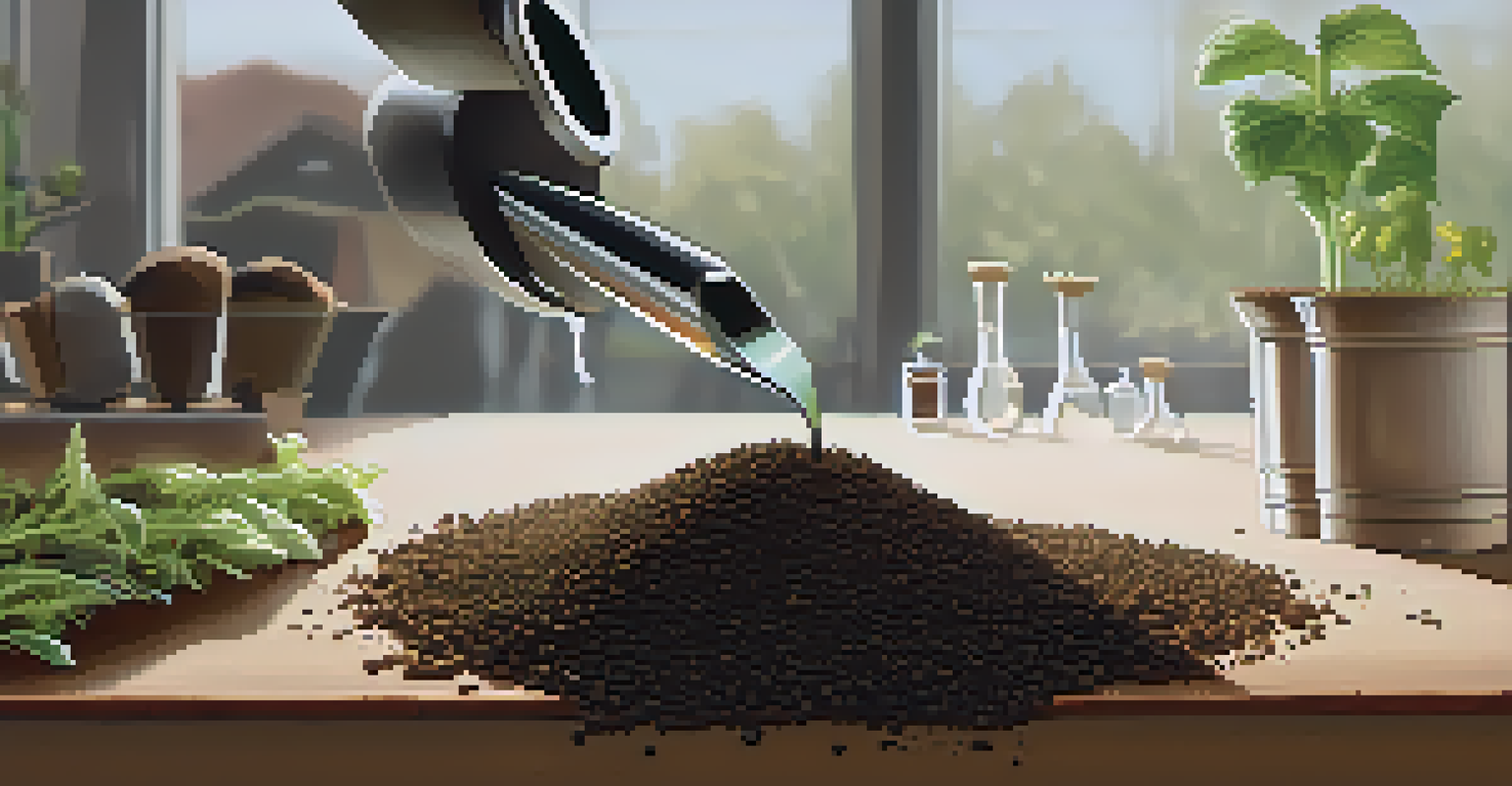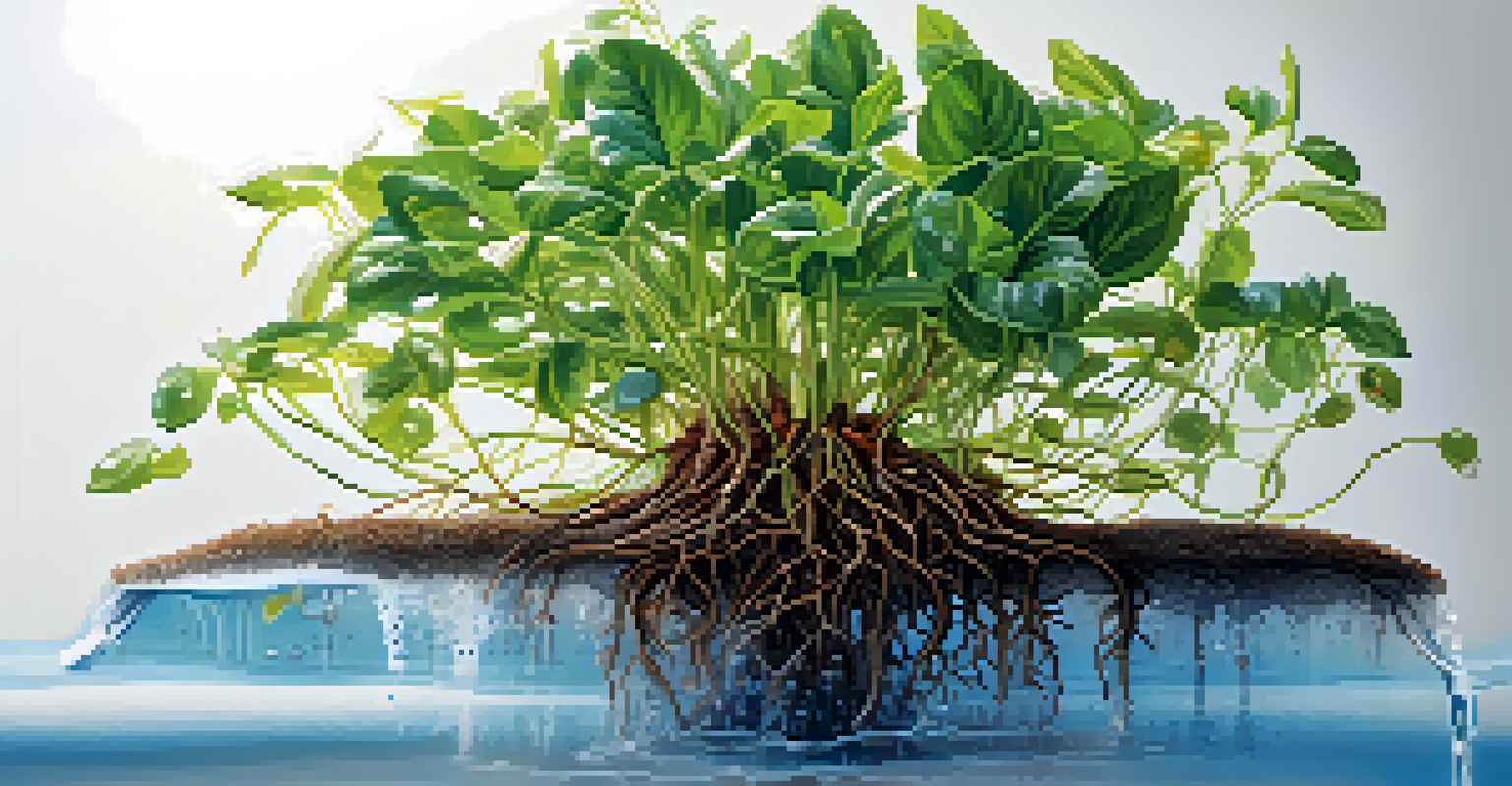Essential Nutrients for Plants: A Comprehensive Guide

Understanding the Importance of Nutrients for Plants
Plants, like all living organisms, require a variety of nutrients to thrive. These nutrients play crucial roles in growth, development, and overall health. Without them, plants can suffer from deficiencies that hinder their ability to photosynthesize and grow.
Plants are like people; they need a balanced diet to thrive and flourish.
Just as humans need a balanced diet for optimal health, plants rely on a mix of essential nutrients. These nutrients can be categorized into macronutrients and micronutrients, each serving distinct functions. Understanding these categories is key to providing the right care for your plants.
For instance, just as a lack of vitamin C can weaken our immune system, a deficiency in nitrogen can stunt plant growth. Knowing what each nutrient does allows gardeners to better support their plants' needs throughout their life cycle.
The Macronutrients: Building Blocks for Plant Growth
Macronutrients are the nutrients that plants require in larger quantities. These include nitrogen (N), phosphorus (P), and potassium (K), commonly referred to as NPK. Each of these elements plays a vital role in different aspects of plant health.

Nitrogen is essential for leaf growth and overall vigor, while phosphorus contributes to root development and flowering. Potassium helps regulate various processes, including water usage and resistance to diseases. Together, they create a robust foundation for healthy plants.
Plants Need Nutrients to Thrive
Essential nutrients, categorized as macronutrients and micronutrients, are crucial for plant growth and health.
Think of macronutrients as the main ingredients in a recipe. Just as you wouldn’t bake a cake without flour, plants need these nutrients to produce strong stems, vibrant leaves, and bountiful blooms.
The Micronutrients: Small but Mighty Plant Essentials
While macronutrients are crucial, micronutrients should not be overlooked. These are elements that plants need in smaller amounts, but they are just as important for optimal growth. Key micronutrients include iron, manganese, zinc, and copper.
Just as a well-tuned instrument produces beautiful music, nutrient-rich soil cultivates vibrant, healthy plants.
Micronutrients play essential roles in processes such as chlorophyll production and enzyme function. For example, iron is vital for photosynthesis, while zinc aids in growth hormone production. A deficiency in any of these can lead to significant health issues for plants.
Imagine trying to build a complex puzzle; each piece, no matter how small, is necessary for the complete picture. Similarly, micronutrients are the small pieces that help plants achieve their full potential.
Signs of Nutrient Deficiency in Plants
Recognizing the signs of nutrient deficiencies is crucial for any gardener. Each nutrient deficiency manifests in unique symptoms, making it easier to diagnose and address issues. For instance, yellowing leaves may indicate nitrogen deficiency, while stunted growth might suggest a lack of phosphorus.
Furthermore, deficiencies can lead to poor flowering or fruiting, impacting the overall yield of edible plants. Observing changes in your plants can serve as an early warning system to correct nutrient imbalances.
Signs of Nutrient Deficiency
Recognizing unique symptoms of nutrient deficiencies, like yellowing leaves or stunted growth, helps gardeners address plant health effectively.
Think of it like a check-engine light in your car; it alerts you to potential problems before they escalate. By being attentive to your plants, you can take proactive steps to ensure their health and productivity.
How to Amend Soil for Nutrient-Rich Growth
Amending soil is a fundamental practice for providing essential nutrients to plants. This involves adding organic matter, fertilizers, or other soil conditioners to enhance nutrient availability. Compost, for instance, is an excellent way to enrich the soil with both macro and micronutrients.
Additionally, soil testing can help determine nutrient levels and pH balance, guiding your amendment choices. By understanding your soil's unique needs, you can create an optimal environment for plant growth.
It's akin to tuning a musical instrument; slight adjustments can lead to harmonious results. By carefully amending your soil, you set the stage for vibrant, healthy plants.
Effective Fertilization Techniques for Plant Nutrition
Fertilization is a key component of plant nutrition, providing a direct source of essential nutrients. Different types of fertilizers, such as synthetic, organic, or slow-release, can be used based on the specific needs of your plants. Each type has its own advantages and is suited for different gardening styles.
For example, organic fertilizers release nutrients slowly over time, improving soil health in the long run. On the other hand, synthetic fertilizers can provide a quick nutrient boost, but may not enhance soil structure. Understanding the best approach for your plants is essential for their sustained growth.
Water Aids Nutrient Uptake
Water is vital for dissolving and transporting nutrients, ensuring that plants can absorb what they need to flourish.
Think of fertilization as a regular meal plan; the right nutrient balance ensures that your plants have the energy to flourish. By choosing the proper fertilization method, you're investing in your garden's future.
The Role of Water in Nutrient Uptake for Plants
Water is often an overlooked yet vital component of nutrient uptake in plants. It acts as a solvent, allowing nutrients to dissolve and be absorbed by plant roots. Without adequate water, even the most nutrient-rich soil can leave plants deficient.
Moreover, water helps to transport nutrients throughout the plant, ensuring that every leaf, stem, and flower receives what it needs to thrive. A well-watered plant is better equipped to take up essential nutrients efficiently.

Consider water as the delivery truck for nutrient supplies; without it, even the best products can't make it to their destination. Maintaining proper hydration not only supports nutrient uptake but also contributes to overall plant health.